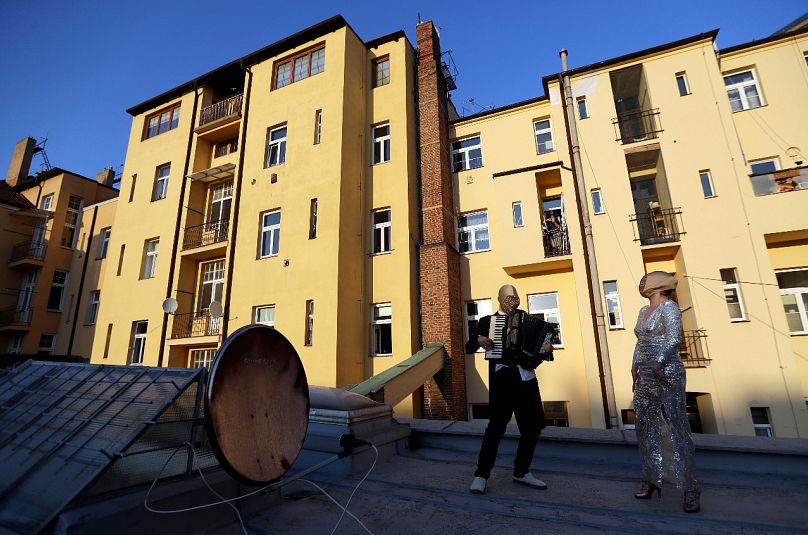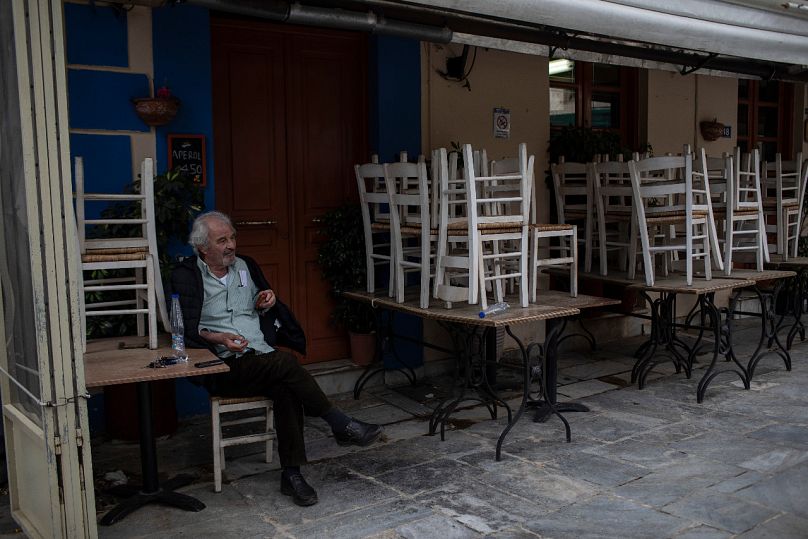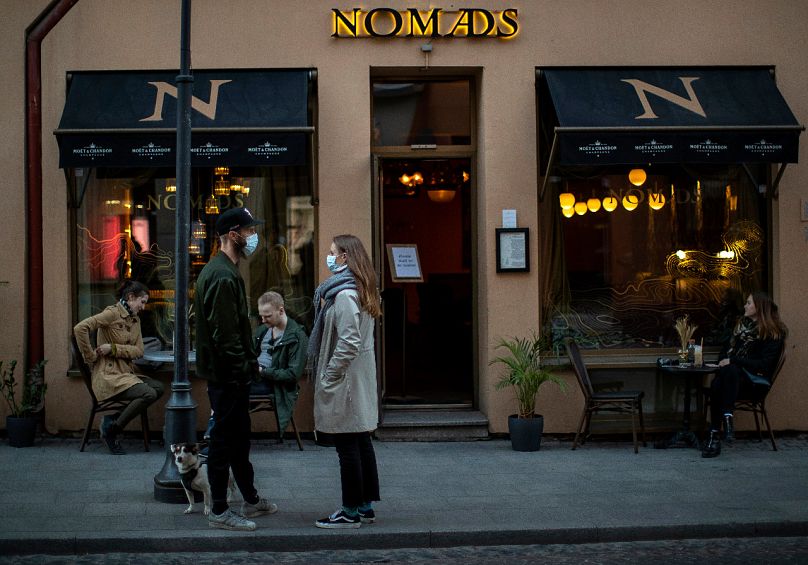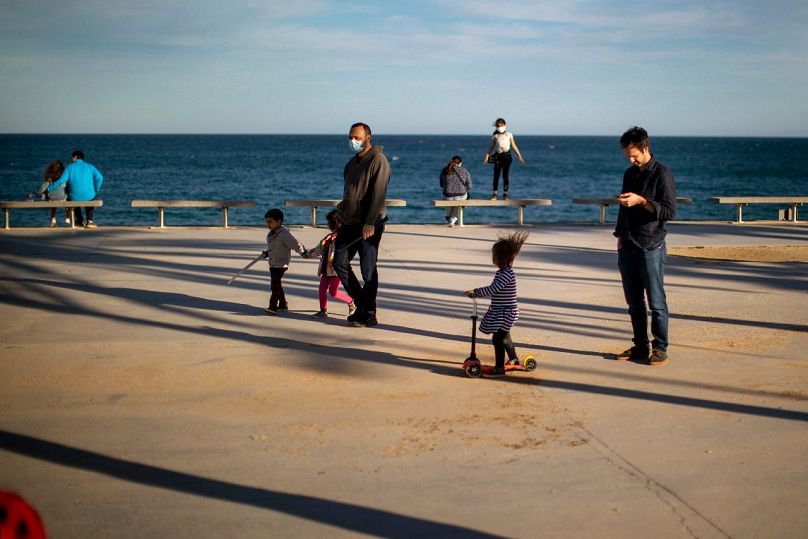Most nations have been setting out tentative plans to ease restrictions and restart rapidly devastated economies.
Many European countries have begun implementing tentative plans to ease lockdowns imposed to combat the spread of the potentially deadly COVID-19 virus -- measures which have drastically restricted freedom of movement and outlawed public gatherings.
 ADVERTISEMENT
ADVERTISEMENT
 ADVERTISEMENT
ADVERTISEMENT
The aim is to restart economies rapidly devastated by the sudden shutdowns brought in to curb infection and death rates, protect health services -- and give people hope that there is light at the end of the tunnel.
Several countries have announced plans to reopen borders with neighbours. The European Commission has called for travel and the tourism business to reopen in a coordinated manner.
But there remains much caution and unease for fear of reversing the progress made in preventing the virus from spreading.
Everywhere, there is concern about a possible second wave of COVID-19 cases, with even more damaging effects (see charts with key statistics at the end of this article).
Here is a look at the state of play in a selection of European countries, both in and outside the EU.
Andorra
The tiny landlocked nation wedged between France and Spain adopted a unique system as it began easing lockdown restrictions.
Those who live in even-numbered homes are allowed to go out on even dates, while those who reside in odd-numbered homes on all other days.
Austria
The country is one of the first in Europe to reopen its economy. Some shops were allowed to reopen after Easter, and the lockdown has since been relaxed further.
Restrictions remain: people not living together must keep a one-metre distance between each other in public at all times.
Restaurants will reopen from May 15, followed by hotels from May 29.
The health minister said good contagion figures justified the decision. However, he appealed to people's individual responsibility in the coming months.
Baltic states
Estonia, Latvia and Lithuania will open their borders to each other from Friday (May 15) after having so far avoiding the worst of the COVID-19 pandemic.
Citizens of each country will be free to move across the area, but anyone entering from outside will have to go into quarantine.
Belgium
Belgium has been relaxing its coronavirus lockdown by opening shops under strict conditions.
Non-essential shops and businesses have been allowed to open progressively since May 4. As of May 10, people are permitted to start meeting with four close relatives or friends.
Visits to the coast and Ardennes forests will be possible from May 18. Bars and restaurants will start reopening from June 8.
But mass events such as music festivals will not happen until at least September.
Czech Republic
Restrictions in the Czech Republic have been lifted gradually since April 24, and from May 11 outdoor areas of bars and restaurants are being allowed to re-open. By May 25 almost all business activity is set to resume.
Some businesses and stores have been allowed to reopen, including Skoda which has restarted car production. Meanwhile gatherings of up to 10 people are being allowed, compared to two under earlier rules.
Internal travel within the country has been permitted since late April and a travel ban for journeys outside the country has been lifted. But anyone returning to the country will have to provide a negative test for COVID-19 or spend time in quarantine.
Border restrictions were eased on April 27 to allow in people from other EU countries for short business trips. Seasonal workers are also allowed in, under restrictions.
Denmark
Denmark began opening up shopping centres from May 11 -- under strict social distancing rules -- as phase two of its lockdown easing came into play.
The country began lifting constraints after Easter, beginning with the re-opening of many nurseries and primary schools, as well as day care centres.
Small businesses were allowed to reopen from April 20, on condition they adhered to strict hygiene regulations.
The country was among the first in Europe to impose lockdown measures, less stringent than in some other nations.
Prime Minister Mette Frederiksen told Parliament on April 29 that the spread of the COVID-19 epidemic was "under control".
France
The strict lockdown in France -- in place since March 17 -- has begun being eased from May 11. The first phase of "de-confinement" will last three weeks and run until June 2.
Restrictions are being lifted at different rates around the country, in line with the pandemic's geographical impact. Relatively strict measures still apply in particularly badly affected areas such as the east of the country and the wider Paris region.
Pre-schools and primary schools will open progressively from May 11, secondary schools will begin following suit a week later, while a decision on high schools will be taken at the end of the month.
People will no longer need to fill out a form justifying the reason for leaving their homes, or for trips of up to 100 kilometres. Social gatherings up to a maximum of 10 people will be allowed. But larger events look set to be banned for several months and the French football season has been cancelled.
Germany
Germany, which has managed to contain the virus better than other world powers, began its first steps to ease restrictions on April 20. Smaller shops have been allowed to reopen while respecting social distancing measures, as have other businesses such as car dealers and bicycle shops.
On May 6 officials cleared the way for restaurants, hotels and remaining stores to reopen in the coming weeks, and for the country's football league to resume play.
They also put in place a requirement for regions to reimpose restrictions if coronavirus infections rebound. There's been concern that the coronavirus infection rate has increased again since the restrictions began being eased.
Under Germany's federal system, states are being left to decide themselves on how and when to reopen theatres, cinemas, bars, clubs and other businesses, and how to open up creches for children before the summer. Students will continue to slowly return to school, the goal being that they see their teachers and classmates at least once before the holidays.
Greece
Some shops in Greece were allowed to reopen on May 11 as the nation entered its second phase of the lockdown.
Retail businesses, including clothing, hardware and beauty product stores, were able to reopen, with social distancing measures applying.
Greece's lockdown introduced on March 23 has been credited for keeping down the country's death toll and number of critically ill patients.
The prime minister has outlined a plan to ease restrictions gradually. Outdoor individual sports have been permitted again since May 4. Restaurants, hotels and shopping centres won't be allowed to open until June 1.
High school seniors restart classes from May 11, followed a week later by other high and secondary school grades. Younger children might go back to school on June 1.
Hungary
Hungary's Prime Minister Viktor Orban says restrictions on leaving homes may be gradually lifted, especially in the countryside areas where there are fewer coronavirus infections. Restrictions will remain in force in Budapest and its surrounding areas.
In a Facebook video he gave no date but said that in the countryside stores would be able to extend opening hours, and cafés and restaurants would be able to reopen terraces and gardens.
Measures allowing only people over 65 to shops in food stores and pharmacies in the morning will remain in place.
Ireland
Ireland’s Taoiseach announced an extension of the country’s coronavirus restrictions to May 18 on May 1. “We need two more weeks of tight restrictions to weaken the virus further,” Leo Varadkar said.
However, he said people over 70 years old who have been told to stay home, or “cocoon” can start going outside their homes starting from Tuesday, as long as they avoid all contact with people.
The 2-kilometre limit that people are allowed to exercise outside their homes will also be extended to 5 kilometres.
Varadkar said that starting May 18, the country plans to reopen the economy in five stages, should the virus stay under control, with the last stage planned for August. Schools will not reopen before the start of the September school year however.
Italy
Italian Prime Minister Giuseppe Conte laid out a timetable on April 26 for reopening the country's economy. It follows a consistent improvement in contagion figures.
Factories, construction sites and wholesale supply businesses can resume activity as soon as they put safety measures in place against the virus. Public parks and gardens have been able to reopen since May 4 -- numbers may be limited to prevent overcrowding -- and people are able to visit relatives who live in the same region.
Funerals will no more than 15 guests can take place but mourners must wear masks.
Retail shops can reopen on May 18, along with restaurants, cafés, barber shops and hair salons. The date was brought forward for the latter categories following demands from regional authorities.
Conte stressed the importance of social distancing and said that if rules were not followed, coronavirus cases and deaths would rise again and there would be "irreparable damage" to the economy.
On March 8 Italy became the first European country to confine people to their homes for all but essential reasons.
Netherlands
The Dutch government has taken the first tentative steps in relaxing its coronavirus containment measures, allowing elementary school children to return to their classrooms -- part-time -- from May 11 and allowing older children to take part in organised sports.
But at the same time, Prime Minister Mark Rutte extended a ban on all large-scale events such as music festivals and professional football until September 1 while bars and restaurants will remain shut until at least May 20.
The Netherlands has been in what Rutte calls an "intelligent lockdown" since mid-March that closed down schools, restaurants, bars and museums but stopped short of ordering people in this nation of 17 million to stay home.
Instead, they were urged to act responsibly to slow the spread of the virus -- to work from home, stay home as much as possible and engage in social distancing if they venture outdoors.
Poland
Shopping centres and hotels across Poland were able to reopen on May 4, with schools and kindergartens to follow two days later, our Brussels correspondent; Darren McCaffrey reported.
The presidential election set to take place on May 10 was suspended following debate over how and when voting could be done safely during the coronavirus pandemic.
Portugal
Portuguese military units have joined forces with secondary schools in preparation for the possible resumption of classes in May.
The army, air force and navy teams are part of a strategy aiming to provide training to school workers to perform a more appropriate and thorough daily clean.
The government ordered the closure of all schools in mid-March to reduce the spread of the coronavirus.
More relaxed controls on population movement and self-isolation rules are expected to be announced as the outbreak ebbs.
Spain
Spain is one of the world's worst affected countries for coronavirus, but improving figures have led the government to announce a tentative exit strategy.
The strict lockdown in place since mid-March is to be eased in four phases, with each stage to last for at least two weeks and conditional on progress.
In phase one which began on May 4, small shops, hotels and tourist accommodation were able to reopen.
From May 11, bars and restaurants in some mostly rural areas are being allowed to open up half of their outdoor seating. Churches, theatres and museums are also being reopened with limits on visitor numbers.
After Easter Spain allowed some employees to return to work in factories, offices and on construction sites.
Adults have been allowed outside for exercise since May 2, something children were allowed to do for limited periods from April 26.
Spain has announced plans to quarantine visitors to the country for two weeks, from May 15.
Sweden
Sweden has resisted a France or Italy-style lockdown of its 10.2 million citizens to avoid the spread of COVID-19.
But some top officials have questioned the policy. The head of the civil contingencies agency said the country could have acted "a little faster", while the health minister said that the number of deaths in care homes showed "we failed to protect our elderly". Figures from late April showed that half of those who had died were in nursing homes.
The government has advised Swedes to work from home when possible and avoid crowded places. But it has stopped short of imposing formal restrictions, urging people to "behave like adults" rather than fining them for leaving home without good reason.
People can move freely, schools, bars and restaurants remain open, and outdoor activities are allowed. However there are some restrictions on international travel.
Meanwhile, gatherings of more than 50 people are banned and some social distancing measures have been implemented.
Switzerland
Switzerland's Federal Council announced that shops, restaurants, museums, libraries, and schools would be allowed to reopen their doors on May 11. A vastly expanded reopening will follow on June 8.
It's part of a multi-layered process that saw some businesses -- including hair salons, tattoo parlours, veterinary surgeries and garden shops -- begin opening on April 27. Precautionary measures including social distancing rules are being taken.
Public gatherings will still be restricted to five people so restaurants that reopen will need to ensure a distance of at least two metres between tables.
United Kingdom
Prime Minister Boris Johnson has announced a modest easing of the coronavirus lockdown, outlining a road map for further lifting restrictions in the coming months.
The overall message has been changed from "stay at home" to "stay alert". But there are differences between the approach for England and those for Scotland, Wales and Northern Ireland.
Following up a TV address on May 10 with a statement in Parliament the following day, Johnson outlined the new advice:
- People who cannot work from home should be encouraged to go to work if their business or organisation is allowed to operate
- Guidance for businesses on making workplaces secure will be published
- People should avoid public transport if possible
- People should wear cloth face coverings in enclosed spaces
- There are no limits on outdoor exercise, and you can rest in a park or play sports with members of your household or with one other person from another household as long as social distancing is observed
- You can drive as far as you like to outdoor spaces
- The UK could move to Phase 2 no earlier than 1 June, when there will be a phased reopening of shops, a return for some pupils to school
The guidance -- most of it due to take effect from May 13 -- drew criticism from opposition parties, including in the UK's devolved nations. Some leaders have made it clear they are keeping in place their own restrictions.
Scotland's First Minister Nicola Sturgeon said on May 11 it was "too risky" to change restrictions, and the message to people remained: "stay home".
Boris Johnson -- who spent three days in intensive care with COVID-19 -- has said key tests must be satisfied in order for restrictions to be lifted. The number of coronavirus cases and deaths in the UK has continued to cause alarm.
The prime minister has warned that lifting restrictions too soon risks a second, even deadlier wave. Ministers and officials have warned against "throwing away" the progress made. But the government has been under pressure to ease the lockdown imposed on March 23, amid widespread damage to the economy.
Under the lockdown most shops and public venues were closed, and people could only leave homes for reasons deemed essential, or to take limited exercise.














